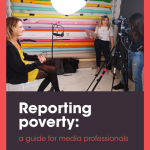Reporting Poverty
Download our guide, developed jointly with people with experience of poverty, the National Union of Journalists, the Joseph Rowntree Foundation, On Road Media and ATD Fourth World.
This practical guide is for journalists who want to report on UK poverty accurately, sensitively and powerfully.
We know the importance of powerful, respectful media coverage of UK poverty and we have worked with many journalists to tell stories of our work and the wider movement to end UK poverty.
We also know today’s newsrooms are more stretched than ever, that journalists are doing ever more work in less time, and that journalists themselves are in a difficult industry. This new guide aims to help.
It offers practical recommendations on how media reporting on poverty can better represent people’s experiences, reduce the risk of negative impacts on people in poverty, and build support for structural solutions.
When speaking to the media, people experiencing poverty want to draw attention to the challenges they face, call for action to improve things, highlight what would make a difference, and show solidarity with others.
Some stories about poverty focus on statistics. Others focus on individual people. Others focus on the systems. The guide shows that the very best coverage includes and balances all three, highlights some of the pitfalls in reporting poverty, and gives clear tips on how to avoid them.
This guide was co-produced by an advisory group, including journalists and media professionals and many people who have experience of poverty and who have shared their stories through the media. The project has been coordinated by ATD Fourth World, Church Action on Poverty, the Joseph Rowntree Foundation, the National Union of Journalists and On Road Media.
Gavin Aitchison, media unit coordinator at Church Action on Poverty, said: “We’re delighted to have played a part in the production of this important new guide. It is full of useful tips and insights, and is a great example of partnership working. The experiences and suggestions from people who we work with who have shared their stories with the media in the past, and from all the journalists involved, was immensely valuable. Responsible, in-depth journalism can challenge and change the systems that hold people in poverty back, and hopefully this guide will help to inspire further good, dignified coverage of the issues around poverty in the UK.”
UPDATE: In spring 2025, Turn2Us produced a further reporting guide, with a particular focus on reporting on the UK’s social security system. That resource includes tips on reporting, useful explanations, a look at some common areas of confusion, and some useful additional resources. A PDF version can be downloaded here.

